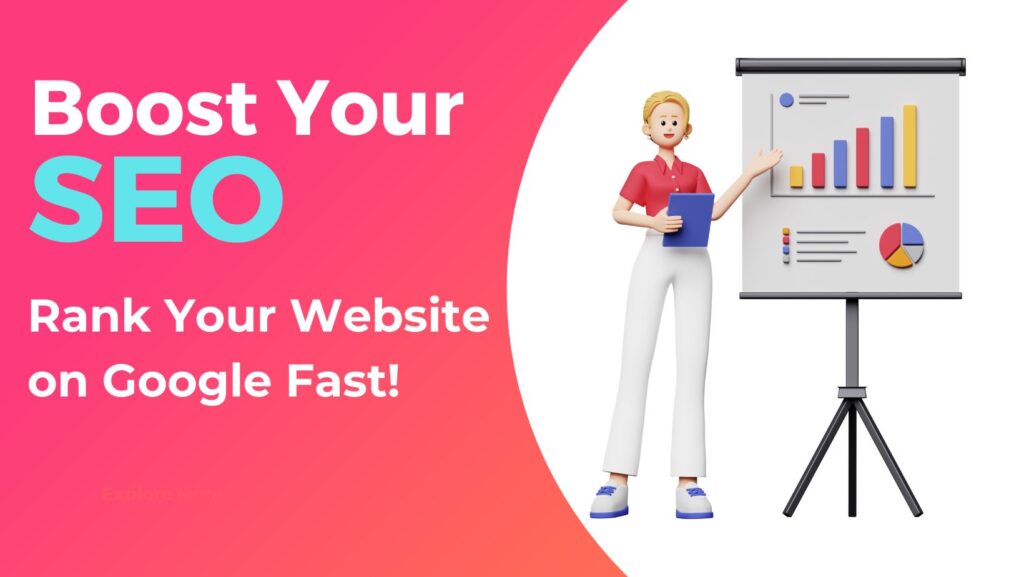Boost Your SEO: Rank Your Website on Google Fast!
Are you tired of your website not gaining enough visibility on Google? Do you dream of having your website rank on the first page of search results? If so, you’re in the right place. In today’s competitive online world, ensuring that your website is optimized for search engines is crucial for driving traffic and attracting potential customers. The process of improving your website’s visibility and ranking on Google is known as search engine optimization (SEO). In this article, we will explore effective strategies and techniques to boost your website’s SEO and help you rank on Google fast. From understanding how to rank your website on Google’s top results to utilizing featured snippets, we’ve got you covered. So, let’s dive in!
Understanding the Importance of Ranking on Google

In the vast and ever-expanding online universe, Google has become an essential tool for anyone seeking information. With millions of websites competing for attention, having your website rank higher on Google has become crucial for businesses and individuals alike. But why is it so important to secure a top spot on Google’s search results?
Firstly, ranking higher on Google means increased visibility. When users search for a particular topic or product, they tend to click on the top results presented to them. In fact, studies have shown that websites listed on the first page of Google receive over 90% of the clicks. So, if your website is buried on page two or beyond, it’s unlikely to receive much traffic. By optimizing your website to rank higher on Google, you increase the chances of reaching a wider audience and driving more organic traffic to your site.
Secondly, ranking high on Google establishes credibility and trust. Users perceive top-ranked websites as more reliable and authoritative. They are more likely to trust the information provided and make a purchase or engage with the content. Being visible on Google shows that your website is relevant and trusted within your industry or niche.
So, how can you improve your website’s ranking on Google? There are several strategies you can employ, such as optimizing your website’s content and structure, building high-quality backlinks, and ensuring a positive user experience. It’s also essential to keep up with the latest SEO trends and Google’s algorithm updates to stay ahead of the competition.
In conclusion, ranking higher on Google is not just about boosting your website’s visibility; it’s about establishing credibility and trust among your target audience. By understanding and implementing effective SEO strategies, you can improve your website’s ranking, attract more organic traffic, and ultimately drive the success of your online presence. So, invest the time and effort into making your website rank higher on Google, and reap the benefits in the long run.
Key Strategies for Optimizing Your Website
In today’s digital age, having a strong online presence is crucial for businesses of all sizes. One of the most effective ways to improve your website’s visibility and attract more organic traffic is through SEO (Search Engine Optimization). By optimizing your website, you can ensure that it appears higher in search engine results and reaches the right audience.
One key strategy to optimize your website is by focusing on informational keywords. These are phrases that people commonly search for when they are looking for information or answers to their questions. By creating content that aligns with these keywords, you can provide valuable information to your audience and increase the chances of your website being discovered. Additionally, by incorporating the “people also ask” feature in search engine results, you can address common queries and position your website as a reliable source of information.
Another important aspect of website optimization is the implementation of site links. Site links are additional links that appear beneath your website’s main link in search results. They provide users with quick access to specific pages on your website, making it easier for them to navigate and find relevant information. By creating a clear and organized website structure, you can increase the chances of search engines displaying site links for your website, which can significantly improve user experience and ultimately drive more traffic.
Lastly, commercial intent keywords play a crucial role in optimizing your website for conversions. These keywords indicate that users are actively searching for products or services to purchase. By targeting these keywords, you can attract highly motivated visitors to your website who are more likely to convert into customers. Conduct thorough keyword research to identify the commercial intent keywords that are relevant to your business, and integrate them strategically into your website’s content and meta tags.
In conclusion, optimizing your website is a continuous process that requires attention to detail and a deep understanding of your target audience. By implementing strategies such as focusing on informational keywords, leveraging the “people also ask” feature, incorporating site links, and targeting commercial intent keywords, you can improve your website’s visibility, attract more organic traffic, and ultimately drive conversions. Stay up-to-date with the latest SEO trends and regularly analyze your website’s performance to ensure it remains optimized for success.
The Role of Keywords in Google Ranking
Keywords play a crucial role in determining the ranking of a website on Google. When users search for specific information or topics, Google tries to display the most relevant and informative results. By strategically using keywords in your website’s content, you increase the chances of ranking higher in search engine results.
One important aspect of keyword optimization is targeting long-tail keywords. Including phrases like “how to rank your website on Google featured snippet 0 0.00” or “related searches 3 weeks” can help your website rank better for specific search queries. Long-tail keywords often have less competition, allowing your website to have a better chance of appearing in the top results.
Moreover, using keywords effectively can help your website rank for informational searches. By incorporating terms like “rank your website on Google informational 30 86 4.40 site links,” you can enhance your content’s informational value, guiding Google to recognize your website as a reliable source of information. This boosts your chances of being featured on Google’s site links, increasing your visibility and driving more organic traffic.
It is important to note that keyword optimization should be done naturally without compromising the quality of your content. Overstuffing your website with keywords can have a negative impact on your ranking. Strive for a balance between keyword inclusion and creating valuable and engaging content to provide the best experience for your users.
In conclusion, keywords are a vital element in determining how well your website ranks on Google. By targeting long-tail keywords and optimizing for informational searches, you can improve your chances of ranking higher in search engine results. Remember to use keywords naturally within your content while providing valuable information to your users. With effective keyword optimization strategies, you can increase your website’s visibility and attract more organic traffic.
Creating High-Quality Content for SEO Success
Creating high-quality content is crucial for achieving SEO success. In today’s digital landscape, search engines like Google constantly update their algorithms to prioritize valuable and informative content. As a website owner or content creator, it is important to understand the key elements that make up high-quality content.
One important aspect of creating high-quality content is understanding related searches. By understanding what users are searching for related to your topic, you can create content that addresses those specific queries. This not only increases the relevance of your content but also helps you capture search traffic from a wider pool of keywords.
Another key element is search engine optimization (SEO). Optimizing your content for search engines helps improve its visibility and ranking. Including relevant keywords, engaging meta descriptions, and well-crafted title tags are some of the key techniques to consider. Additionally, focusing on informational content that provides value to readers is crucial for SEO success.
To enhance the quality of your content, consider the length and depth of your articles. Longer articles tend to perform better in search engine rankings as they provide more comprehensive information on a given topic. In addition, including external links to reputable sources and internal links to related articles on your website can help establish your content as a valuable resource.
In conclusion, creating high-quality content is essential for SEO success. By understanding related searches, optimizing your content for search engines, and focusing on delivering valuable information, you can improve your website’s visibility and attract more organic traffic. Keep these key elements in mind when developing your content strategy to achieve SEO success.
Leveraging Backlinks to Improve Your Google Ranking
When it comes to improving your website’s ranking on Google, one effective strategy you can implement is leveraging backlinks. Backlinks are links that are directed towards your website from another website, and they play a crucial role in determining your website’s authority and credibility. By incorporating high-quality backlinks into your website’s SEO strategy, you can significantly boost your chances of ranking higher on Google’s search results page.
One way to improve your website ranking on Google is by focusing on informational backlinks. These types of backlinks come from authoritative sources and provide valuable information to users. By obtaining backlinks from reputable websites that have a high domain authority, you can increase your website’s credibility in the eyes of Google’s algorithm. Look for websites that are related to your industry and offer informative content that aligns with your website’s theme. Getting informational backlinks can take time and effort, but the results are well worth it in terms of boosting your website’s ranking.
Another effective method to improve your website ranking on Google is by optimizing your site for search page links. Search page optimization involves making your website more visible and appealing to users, ultimately increasing the chances of obtaining organic traffic. One way to achieve this is by creating high-quality, relevant content that is optimized with targeted keywords. By strategically placing these keywords throughout your website, you can attract more visitors and increase the likelihood of other websites linking to your content. This, in turn, improves your chances of ranking higher on Google.
To make your website rank higher on Google, it’s essential to focus on obtaining backlinks from diverse sources. This means going beyond just informational backlinks and search page optimization. Consider reaching out to influencers in your industry or engaging in guest posting on relevant websites. By diversifying your backlink profile, you create a higher level of legitimacy and authority in the eyes of Google. This, in turn, can significantly improve your website’s ranking on Google and drive more organic traffic to your site.
In conclusion, leveraging backlinks is an effective strategy to improve your website’s ranking on Google. By obtaining high-quality informational backlinks, optimizing your site for search page links, and diversifying your backlink profile, you can increase your website’s authority and credibility. This ultimately improves your chances of ranking higher on Google’s search results page and attracting more organic traffic to your site. Incorporate these strategies into your SEO efforts and watch as your website climbs the ranks on Google.
Utilizing Featured Snippets for Quick Ranking
Featured snippets are a powerful tool for quickly boosting your website’s ranking on Google. These snippets, often referred to as “position zero,” are concise answers to users’ search queries that appear at the top of Google’s search results. By optimizing your content to appear in these snippets, you can significantly increase your visibility and drive more organic traffic to your website.
To effectively rank your website in featured snippets, it’s important to understand the types of queries that trigger these snippets. Google’s featured snippets are typically displayed for informational queries, where users are seeking quick answers or concise information. By identifying these queries related to your industry or niche, you can create content that directly addresses these questions.
One strategy to improve your chances of appearing in featured snippets is to provide clear and concise answers within your content. When creating articles or blog posts, aim to provide direct and succinct answers to commonly asked questions. Use bullet points or numbered lists to break down information into easily digestible chunks. This not only enhances the readability of your content but also increases the likelihood of Google selecting your content for a featured snippet.
Additionally, optimize your content by using relevant keywords that align with the search queries you want to target. Include these keywords naturally within your headings, subheadings, and paragraphs. By strategically placing these keywords, you can signal to Google that your content is relevant and authoritative.
It’s also important to structure your content in a way that makes it easy for Google to extract information for a featured snippet. Use HTML tags such as <h1>, <h2>, and <h3> to organize your content and make it more accessible to search engines. Consider including a summary or conclusion section at the beginning or end of your article, where you provide a concise overview of the information presented.
In conclusion, utilizing featured snippets can quickly improve your website’s ranking on Google. By creating content that directly addresses informational queries, providing clear and concise answers, and optimizing your content with relevant keywords, you can increase your chances of appearing in featured snippets. This can significantly boost your website’s visibility and drive more organic traffic to your site. Incorporate these strategies into your SEO efforts and watch as your website climbs the ranks on Google.
Monitoring and Adjusting Your SEO Strategy
Monitoring and adjusting your SEO strategy is essential to ensure that your website maintains a high ranking on Google. Search engine algorithms are constantly evolving, and what works today may not work tomorrow. By regularly analyzing your website’s performance and making necessary adjustments, you can stay ahead of the competition and continue to improve your SEO efforts.
One important aspect of monitoring your SEO strategy is keeping an eye on your website’s ranking for targeted keywords. By regularly checking where your website appears in search engine results for specific keywords, you can gauge the effectiveness of your optimization efforts. If you notice a decline in rankings, it may indicate that your current strategy needs adjustment. Look for patterns and identify any factors that may be affecting your rankings, such as changes in search algorithms or increased competition.
Another key element of monitoring your SEO strategy is analyzing your website’s traffic and user behavior. Utilize tools like Google Analytics to track the number of visitors, their demographics, and how they interact with your site. This data can provide valuable insights into which pages are performing well and which ones need improvement. For example, if you notice a high bounce rate on certain pages, it may indicate that the content or user experience needs to be optimized.
In addition to monitoring your website’s performance, it’s important to stay updated on the latest SEO trends and algorithm changes. Search engines like Google frequently update their algorithms to provide users with the most relevant and high-quality content. By staying informed about these updates, you can adjust your strategy accordingly and ensure that your website remains in compliance with the latest guidelines. Follow industry blogs, attend webinars, and participate in forums to stay up-to-date with the latest SEO trends and best practices.
Lastly, regularly reviewing and optimizing your on-page and off-page SEO elements is crucial for maintaining a strong ranking on Google. On-page optimization includes factors such as keyword usage, meta tags, and content quality. Off-page optimization involves building high-quality backlinks and promoting your website through social media and other channels. By continuously refining these elements, you can improve your website’s visibility and authority in search engine results.
In conclusion, monitoring and adjusting your SEO strategy is vital for maintaining a high ranking on Google. Regularly analyze your website’s performance, track keyword rankings, and stay updated on the latest SEO trends. By making necessary adjustments and optimizing both on-page and off-page elements, you can ensure that your website remains competitive and continues to attract organic traffic. Keep in mind that SEO is an ongoing process, and staying proactive will yield long-term benefits for your online presence.
Conclusion
Ranking your website on Google is not a one-time task but an ongoing process that requires constant effort and adaptation. By implementing the key strategies discussed in this article, such as understanding the importance of Google ranking, optimizing your website’s content and structure, leveraging keywords, creating high-quality content, utilizing backlinks, and monitoring your SEO strategy, you can significantly improve your website’s visibility and attract more organic traffic. Remember, SEO is a dynamic field, and staying up-to-date with the latest trends and algorithm changes is crucial for long-term success. Start implementing these strategies today and watch your website climb the ranks on Google, driving more traffic and achieving your online goals.


